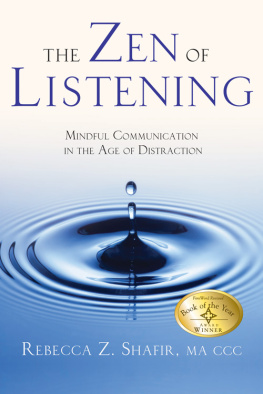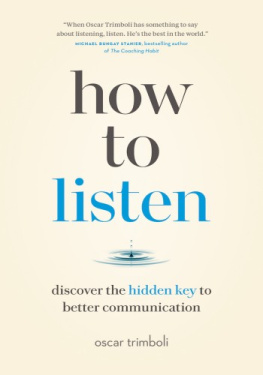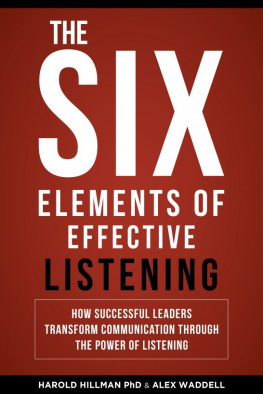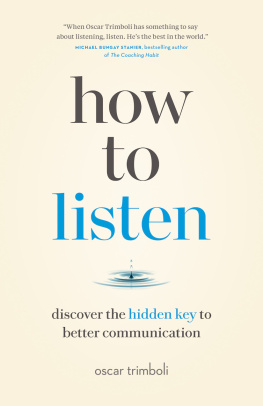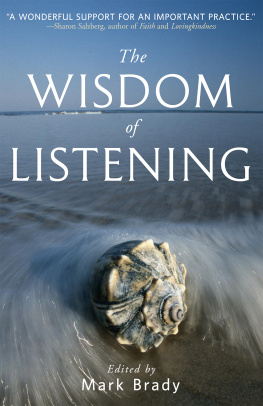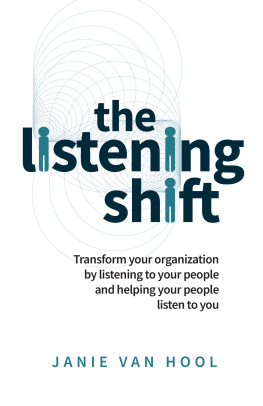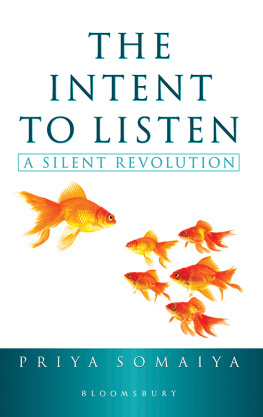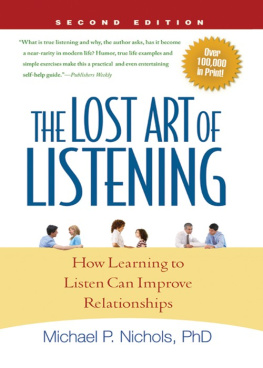
THE ZEN OF LISTENING
MINDFUL COMMUNICATION IN THE AGE OF DISTRACTION
REBECCA Z. SHAFIR, M.A. CCC

Learn more about Rebecca Z. Shafir and her work at www.mindfulcommunication.com
Find more books like this at www.questbooks.net
Copyright 2000, 2003 by Rebecca Z. Shafir
First Quest Edition 2000
Second Edition 2003
Sixth Printing 2011
Quest Books
Theosophical Publishing House
P. O. Box 270
Wheaton, IL 60187-0270
Without limiting the rights under copyright reserved above, no part of this publication may be reproduced, stored in or introduced into a retrieval system, or transmitted, in any form, or by any means (electronic, mechanical, photocopying, recording, or otherwise), without the prior written permission of the publisher of this book.
The scanning, uploading, and distribution of this book via the Internet or via any other means without the permission of the publisher is illegal and punishable by law. Please purchase only authorized electronic editions, and do not participate in or encourage electronic piracy of copyrighted materials.
While the author has made every effort to provide accurate telephone numbers and Internet addresses at the time of publication, neither the publisher nor the author assumes any responsibility for errors or for changes that occur after publication. Further, the publisher does not have any control over and does not assume any responsibility for author or third-party websites or their content.
Library of Congress Cataloging-in-Publication Data
Shafir, Rebecca Z.
The zen of listening: mindful communication in the age of distraction /
Rebecca Z. Shafir.
p. cm.
Quest books.
Includes bibliographical references.
ISBN 978-0-8356-0826-8
1. Listening. I. Title.
BF323.L5 S53 2000
ISBN for electronic edition, e-pub format: 978-0-8356-2031-4
Preface to the Second Edition
Since the publication of The Zen of Listening in 2000, numerous readers and students from all over the world have been kind enough to share their eureka! listening moments with me. It gives one hope to know that the so-called simple act of listening can engender profound personal change in transforming a business, reconnecting an adult child with his estranged parents, and saving marriages. And yet such benefits occur every day to people when they choose to listen to each other in mindfulness.
Take Evelyn, for example: a young, talented lawyer from Los Angeles who felt that the adversarial process of litigation was making her, in her words, confrontative not only in the courtroom, but in the bedroom as well. She became the object of disciplinary action at her law practice for client negligence. Shocked by this accusationafter all, she put in over sixty hours a week for the practiceshe sat through a kind but reprimanding lecture by a partner in the firm. Complaints included not returning phone calls; moreover, when she did, clients felt that she distanced herself from their pain. Associates felt she talked too much and listened too little. Unable to shake the do-or-die mentality when she was at home, Evelyn received similar feedback from her husband and friends. Her righteous, self-serving attitude was creating a gradual disconnection between her and her loved ones. She was becoming scattered and irritable. When her husband faced her with the prospect of divorce, Evelyn woke up.
She started taking yoga classes on the weekend. A friend in her classa fellow attorney who had traveled a similar pathgave her The Zen of Listening. Evelyn began introducing mindful minutes into her day. Over the next several days, she began to appreciate how her boss tended to his clients in a way that didnt leave him exhausted, frustrated, or angry when he went home. She noticed how listening more and allowing some silence helped her get a palpable sense of her clients real interests in solving their dilemmas. This insight led her to envision more creative and amicable solutions for them. As Evelyn recently reflected, Mindful listening put my life in balance.
Clifford, a forty-two-year-old single man who lives in Chicago, used to dread visiting his elderly parents. Without fail, after the usual small talk about work and the weather, his parents always seemed to sneak in some advice and suggestions for helping him find a nice girl, getting married, and raising a family. Clifford, through mindful listening practice, was able to put aside his anger; instead, he saw his parents nagging as their way of helping him find happiness in the only way they knew how. Rather than storm out of the house as he used to, leaving behind bad feelings, Clifford learned to set aside his defensiveness and accept his parents concern for him. He listened in mindfulness and thanked them for their suggestions. Delighted that they had been heard, his parents were able to hear Cliffords side. Even if they could not accept his life choices, they agreed that preserving their relationship was more important.
Daniel, a minister from Adelaide, Australia, began teaching mindful listening in his marriage counseling sessions. Learning to listen is the first rule of love, he noted to me. Listening to oneself helps one make the right choices. Without whole-hearted, selfless listening to your spouse, there is no respect. And without respect, there is no happiness in marriage. The hardest part was getting these young adults to sit quietly and think about someone else besides himself or herself. Daniel was able to accomplish this aim by bringing other adults into the sessionspeople who were either in the same age group as his young congregants or slightly olderto share their marital problems and regrets. These counseling sessions grew larger and became more popular. Before you knew it, people were bringing food and making new friends.... Helping others through tough times: thats what listening is all about.
I also want to share a personal story with you that strikes me as an apt metaphor for the process of mindful listening. Some of my clients and I recently took a trip to a postcard-perfect uninhabited isle in the Caribbean. Deemed a must-visit destination on our travel map, the island with its captivating beauty seemed designed to lull visitors into a hypnotic state of tranquility.
Once we had gotten past the confectioners sugar-like sandy beaches, our guide led us through a tropical palm forest dripping overhead with vines of succulent orange flowers. Tiny painted lizards and gekkos scurried across the not-so-well beaten path, which turned quickly into a treacherously steep trail lined with wild cacti. My hitherto dreamy state of consciousness began to dissipate, especially upon hearing the distant sound of a rhythmic, low, thunderous booma curious intrusion to the sweet trills of the little purple birds that had welcomed us to this paradise just minutes ago. We ascended the narrow hilly path, treading carefully upon the slippery rocks and linking hands for support on the steeper parts. Clearly, this hike required more climbing traction than my weatherbeaten flip-flops could provide. Wishing I had better prepared myself for the terrain, I leaned against a prickly cactus tree, removed the sandals, and caught up with the group. My arms and back did not emerge from the prickly encounter unscathed.
Several minutes later, as we neared the top, the thunderous beats pulsed even louder. When we reached the precipice, our conga line came to a halt. Our guide yelled, Hold on... and look
Next page
